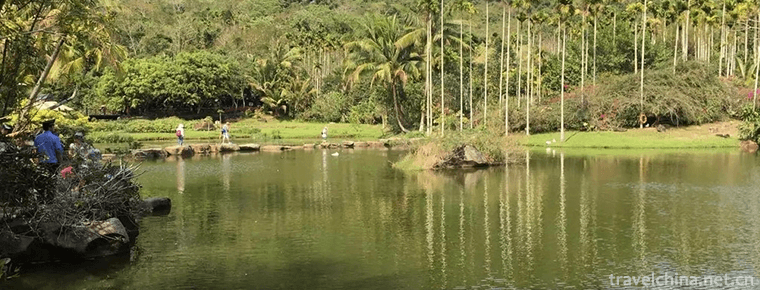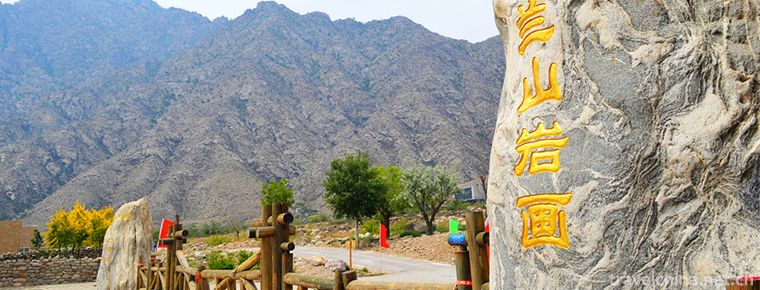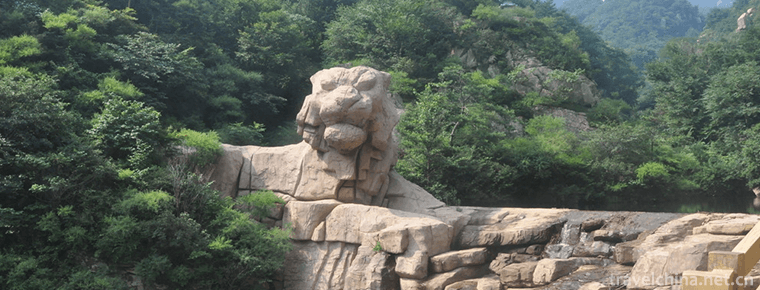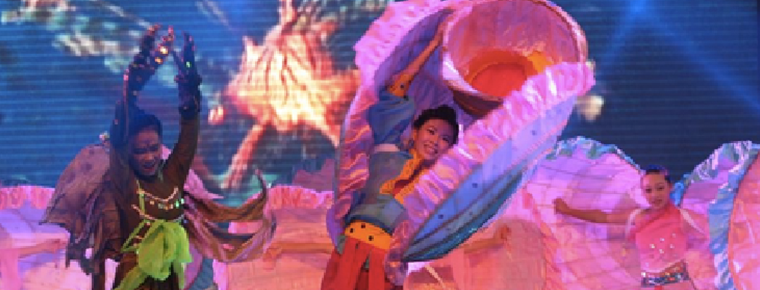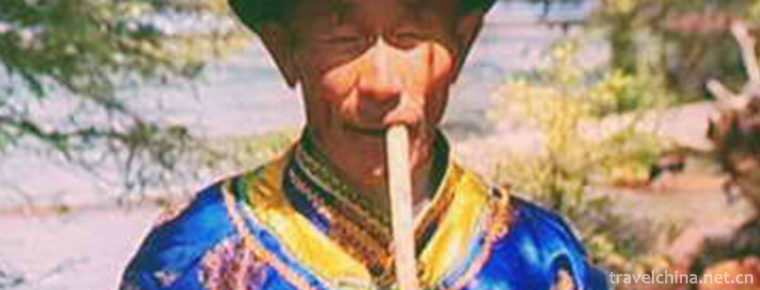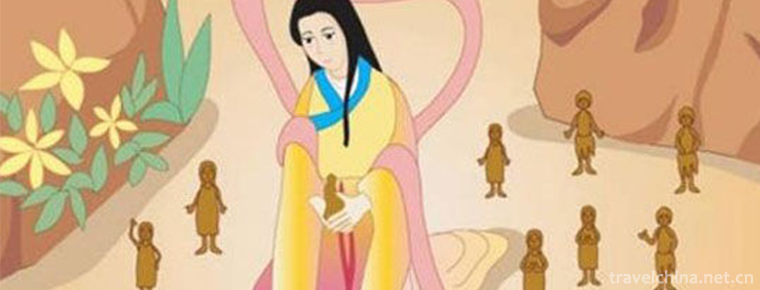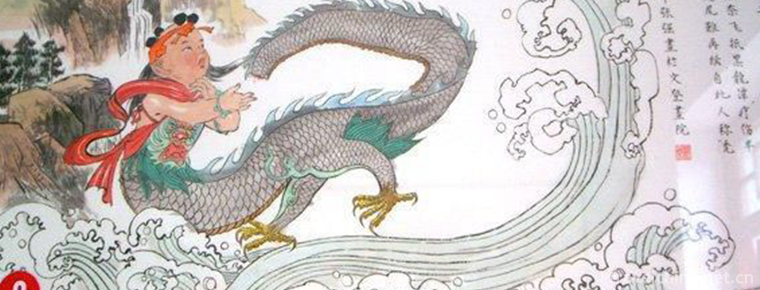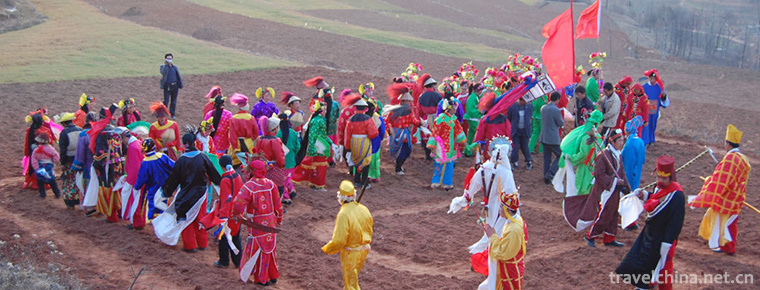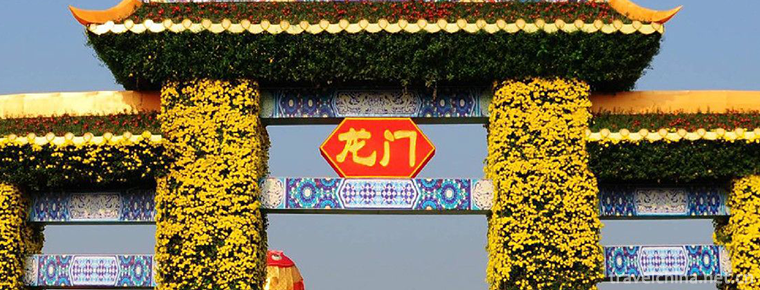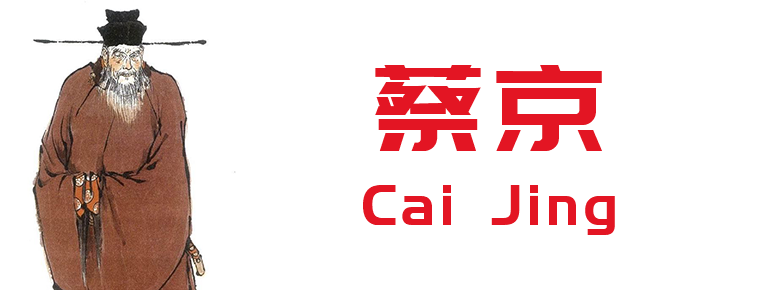Childrens play
Childrens play
Tongzi Opera, a local traditional drama in Tongzhou City, Jiangsu Province, is one of the national intangible cultural heritage.
Tongzi Opera is a form of performance in folk prayer activities in Jiangsu Province. It is popular in Nantong City of Jiangsu Province and in the central and western parts of Tongzhou City and its surrounding areas. It is called "ShangTongzi" or "Tongzisheng" locally. Its performance form has a history of more than a thousand years. Tongzi Opera uses Nantong dialect to sing, accompanied by percussion instruments. Its voice is strange, high-spirited and sad. It has a strong impact. The content of singing is mostly related to demons, ghosts and immortals.
On June 7, 2008, Tongzi Opera was approved by the State Council of the People's Republic of China to be included in the second batch of national intangible cultural heritage catalogues, the heritage number IV-105.
historical origin
Origin of Plays
During the reign of Tang Zhenguan (627 - 649), five students from Jianghuai went to Beijing to take the exam. They missed the exam and did not return home. They make a living by playing, playing and singing folk songs in Chang'an City. Wang Xuan of Tang Dynasty presented art at the Golden Palace, accompanied by morning and evening. One day, Mr. Zhang Tianshi of Longhu Mountain entered the palace. Tang Wangwang wanted to try the skill of Tianshi, let Wuzhi people hide in the pit of His Royal Highness Jin, cover it with boards, agree to stamp their feet as a sign, and command the music to start and stop. Tianshi went to the Golden Palace, only heard the music drifting and fading, and no one was seen. King Tang joked that the master of heaven brought demons into the palace. The Master of Heaven offered sacrifices to the sword and chopped five of them. The Wujuren turned into a wrongful soul and made a great noise in the palace, demanding the life of the Tang King. The King of Tang had no choice but to ask the disciples of the three Fairies in the Temple of Heaven to use witchcraft rituals to settle the dispute. King Tang Zefeng's three fairies and her disciples were the children who exorcised Naji.
The boy who was crowned by the emperor was greatly rewarded, and it became a special permission to sing stories of the flourishing Tang Dynasty. So they traveled to the Moon Palace with the soul of Tang King, the dream of Wei Zheng, the old dragon of Jinghe, the monk of Tang Dynasty of Jiangliu, the watermelon offered by Liu Dufu in winter, and the father of Jiulong, the youngest son of Wei Zheng, went to heaven and earth to invite God to visit ten temples, the Jade Emperor, the stars and the stars, and all the big and small temples, respectfully inviting all the Bodhisattva gods to do the disaster relief and victory meeting to chase the epidemic Naji. One by one deduced into drum CI opera, commonly known as thirteen and a half children's books. This series of stories of the Tang Dynasty, similar to contemporary serial plays, became the main body of children's drama.
There are four main types of traditional Nuo Opera in China: folk nuo, court nuo, military Nuo and temple nuo. Tongzi Opera in Shuyang, Jiangsu Province belongs to the series of folk Nuo and court nuo. There are three reasons. First, according to Shi Ji Gong Chuan, "East of Pengcheng, Donghai, Wu Guangling, this eastern Chu also." "The Chu people believe in witches and ghosts" in Hanshu Geographic Records. It can be seen that Shuyang area is still the territory of Chu State, deeply influenced by witch culture, and has its historical inheritance to witch culture; secondly, the remaining children's play still has strong witch cultural heritage in the form of performance, and its performance is totally dependent on superstitious activities such as "burning pigs" and so on; thirdly, the existing children's plays are all life plays and public case plays. Therefore, it belongs to folk Nuo and palace Nuo series.
Shuyang was a Tongxian County in the Southern and Northern Dynasties, and the children's play was named for its spreading area. In addition, the play was sung by children. Folk people have the saying of "old Yin and Yang, young children". The children's character also refers to children. The opera is named for its singer's body. Therefore, Nuo Dance is the just origin of children's play.
development history
Tongzi Opera originated in the Tang Dynasty. It evolved from the ancient traditional sacrificial dance and had a close relationship with witchcraft. By the middle of the Qing Dynasty, it gradually completed the transition from entertaining gods to entertaining people, and developed into a theatrical style.
Tongzhou began to land in the Southern and Northern Dynasties, and was established in the later Zhou Dynasty (958 A.D.). At the beginning of the land, because of the surroundings of water, desolation and poverty, the primitive people came from all directions, so the witchcraft in Chuyue and other places was inherited.
Since the mid-Ming Dynasty, Tongzhou folk witchcraft activities, marked by children's play, have been very active. According to historical data, in the forty-four years of Wanli (1616) City God Meeting, "decorating the charm of the various mandarins, parading in Qushi, easy to be in the ghost." It can be seen that there was a huge "children's club" at that time.
By the Qing Dynasty, children's clubs had spread all over the city and countryside, which was often depicted in literati's works: "Marlboro Qiucheng Zhu Mancang, village contest drum and witch busy." (Hailing Bamboo Branch Ci)
During the period of the Republic of China, the activities of witches have developed from simple family sacrifices, praying for good fortune and eliminating disasters to folk theatre activities. Many people and tens of thousands of spectators attended the performances.
After the founding of New China, with the progress of human society, feudal superstition activities were gradually curbed. At the same time, fewer and fewer people could sing children's plays, which were replaced by other plays, so children's plays were gradually lost.
Evolution process
Tongzi Opera evolved from the religious rituals of "Shang Tongzi" and "Tongzi Club" in ancient Tongzhou, and its development trajectory is at least more than a thousand years.
"Shangtongzi" is a family-by-family religious ritual of exorcising demons, curing diseases and eliminating disasters. It can be divided into "Hualanmen", "Duguan Paper", "Xiaojin Tang", "Three Tables and Three Saints", "Three Tables and Five Saints", "Five Tables and Seven Saints", "Seven Tables and Nine Tables and Thirteen Saints" and so on. Among them, "Hualanmen" is the simplest, only one child, and the process is simple; while "Nine Forms and Thirteen Saints" is the largest, which takes three days and three nights, and dozens of children participate. Up to now, Tongzhou folk rituals such as "Nine Forms and Thirteen Saints" are rare, but the common ones are those with simpler process and less participation.
The Children's Club, also known as the Disaster Relief and Victory Club, is a kind of disaster relief and praying activities carried out by the non-governmental groups. It is a relatively large-scale organization, generally organized by the "Head of the Club" and funded by the non-governmental organizations. According to the seasons, seasons, regions, industries, natural disasters and man-made disasters, they can be named as Yuhuang Club, Dutian Club, Dongyue Club, Guanyin Club, Lao Ye Club, Yulan Club, Qingmiao Club, Harvest Club, Dragon King Club and so on. With the progress of society, the prosperity of science and the fundamental changes in the actual content of Tongzhou "Temple Fair", such large-scale children's festival activities are rare.
In 1957, the first children's theatre troupe was established in Nantong, and it was named "Tongju". So far, the children's play, which has a history of more than one thousand years, has formally "entered the room" and become a member of many local plays in Jiangsu. The main performances of children's plays are traditional costume plays, such as "Li Zhaoting", "Chen Ying sells water", "Qin Xianglian", "Tang Monk takes sutras", "Zheng Sanlang", "Jiulong saves his father" and so on. Among them, children's performers compiled plays, and other dramas transplanted from other places.
Cultural characteristics
The children's play originated from the witchcraft singing of "deity by dancing". It blended with local dialects, culture, customs and customs, and gradually formed a traditional drama with distinct local color.
Language and Singing
Tongzi Opera uses Nantong dialect and local language, singing slang tunes, with strong local characteristics and local flavor. The singing is loud and clear, like crying. There are mainly bellboard cavity, drum cavity, holy cavity, Book cavity and happy cavity. Most of the lyric sentences are seven-character sentences and cross sentences which are popular with the common people.
Half-piece instrument
The children's opera band is composed of percussion music, big drums, gongs, boxes, hand drums, etc. without stringed instruments.
Child Category
Boys can be divided into two kinds: literary boys and martial arts boys. Wen Tong mainly sings while Wu Tong combines acrobatics and Qigong as a whole, which is thrilling and exciting.
Performing Arts
Tongzi Opera not only uses Haizhou dialect as the stage language, but also sings the classical tune of "Tongzi Tune", which is called "Mao'a Sea". The singing method is four sentences turning around. It is more similar to the tune and rhythm of fishermen's chant "Hi-ah" and peasant's chant "II Aha-hey". It is only a little more artistic and rhythmic, so both men, women and children can understand and love to listen to it. Traditional children's operas have thirty headings and four volumes, sixty-eight singles. Although many of them have different names, their basic themes are basically the same. In the form of myths and legends, children's opera artists call themselves "good deeds". There are only percussion music accompanied by gongs and drums and cymbals, no orchestral music, some only use two one-sided dog skin drums and a small bell; the traditional singing forms are: stage play, disguised as stage performance; "stage play", a small table with two people, singing opposite one-sided drums; "hall play", singing in the house; "hitting the front words", the performers are one or two. People stand in front of their doors, drumming and singing a piece of opera, asking for money and food to mix their lives. Children's play is commonly known as "grand drama", which is considered to be elegant, stable and orthodox, and it is a grandmother's play. Some people with serious feudal ideas forbid women to watch small plays at home, but they can invite children's play to singing at home for women, or grandma can lead girls to the theatre.
Inside-the-line rules
The rules and customs of children's play are very strict. The grandfather of the children's opera artist's belief was also the Tang Ming Emperor. He pasted a "pagoda" spiritual tablet with yellow paper, painted a black head on the top, and wrote "Long live the Tang Ming Emperor" in the middle, with the four words "serve incense fire" on both sides. He was usually stored in a suitcase, which was the "main suitcase". No one except Xiaohua Face could sit on it. Children's play is busiest in December and January every year. At this time, the people pray for peace most. But no matter how busy they are, on the 30th night of December, all clothing props should be "sealed" in the boxes. When sealing the boxes, some cakes should be placed in each box, called "open high (cake)" or "open high (cake)". On the first day of the opening ceremony, the performers should bow their heads to their grandparents before they enter the stage. The first performance of the opening ceremony must sing a magic opera: Cen Xiang Save Mother and Han Xiangzi Du Wife.
There are strict rules and customs among children's opera artists. When an artist comes to the theatre, he or she must strictly identify himself according to the common rules. When an outsider sees his or her master, he or she should first hold his fist in his chest and humbly snuggle and say, "The Tang immortals have worked hard." In class: "What line are you in?" Answer: "Good deeds." Then ask, "Which runner are you running with (that is, the name of the master)?" Answer: "Mr. Jiashi * Zhuang * Lao, above * word, below * word." After answering, he went to the throne of Tang Ming Emperor, lit three incense sticks and inserted them into the incense burner, then knocked three heads and made three pinches, so that he would be regarded as a regular educated insider, or a class singing opera, or helping solve difficulties. When he left, he would welcome him and welcome him.
Children's opera artists are not allowed to move drums or stick gongs; they are not allowed to take off their underwear or lie on their back or prone while sleeping; they are only allowed to lie on their side, commonly known as "standing asleep"; they are strictly prohibited to talk about dragons, teeth, tigers, dreams, fogs and thunder when they get up in the morning; a series of jargon has been formed among their peers; for example, teachers - "noble predecessors", apprentices - "walkers", knives - "Qingfeng Zi". Gun -- "Red Tamarisk", Drum -- "Huaqiang Zi", Gong -- "Haixuan Zi", cymbal -- "Idiot Zi", Cambodia board -- "Yunyangzi", beard -- "eaves", suitcase -- "taking gold", drinking more -- "Haihuanzi", singing less -- "scissors ring", singing incorrectly -- "bianzi", eating -- "burden Lianzi", sleeping -- "hanging head". The fog -- "hanging up the tent" and the mute -- "partial moon". Numbers are expressed as follows: "-'Tiao', 2'Si', 3'Name', 4'Zhi', 5'Tou', 6'Rope', 7'Correction', 8'Climbing', 9'Ai', 10'Bald Thousands'."
Inheritance pedigree
The inheritance of children's play mainly consists of two kinds: teacher-apprentice teaching and family inheritance. During the period of the Republic of China, the famous performers of children's drama were Dai et al., a girl squeezed with shrimps from Dongxiang Township of Tongzhou, and Juliens from Northeast Township of Baipu. According to the Times, Dai waited for the girls'hair knife club (one of the children's clubs), "barefoot climbing the knife mountain bound by the knife of the loom, singing obscene lyrics to the top, and the viewers are like ants." (Tonghai Xinbao) Apparently, Dai waited for the girl to be a martial arts girl with extraordinary skills.
During the period of the Republic of China, the activities of witches have developed from simple family sacrifices, praying for good fortune and eliminating disasters to folk theatre activities. Many people and tens of thousands of spectators attended the performances. Xingren Township Dao Club "extended the recruitment of wizard men and women, singing obscene words and songs on the top of knife Hill tied by looms, gongs and drums are noisy, women and children in rural foolish villages generally rush around like ants." (Tonghai Xinbao) In the ten years of the Republic of China (1921), Xu Changyuan, a child artist in Qinzao Township, bought his own costumes and organized horse performances to persuade Shiwen "Tang monks to learn scriptures" under the influence of Beijing Hui opera performances.
The representative family inheritance is Hu Yulong, Hu Songshan and Hu Xiping, three generations of ancestors and grandchildren of Liu Qiao Town. Hu family is an acrobatics family. It integrates acrobatics and other difficult performance actions into children's play, which increases the ornamental value.
Later, through a census of children's plays in Nantong, 19 representative figures, such as Chen Zhanglin, Dong Yongqing, Gramson and Gu Jingqing, were identified and their genealogy of inheritance was initially listed.
Distribution area
Tongzi Opera mainly distributes in the central and western part of Tongzhou and its surrounding areas (including Rudong, Rugao and parts of Nantong City). This area is an alluvial plain of the Yangtze River Delta, with warm and humid climate, fertile land, dense river network, rich in grain and cotton, and is a relatively developed area.
Representative Works
The representative performances of the children's drama include Journey to the West, Wangyou Difu of Tang Dynasty, Liu Quan Jingua, Shangbao Gong, Huaxian Guo, Liu Wenlong's Request for Official Affairs, Wang Qingming's Contract, Li Zhaoting's Return from Marriage, Zhao Wuniang's Eating Chaff, Li Sanniang's Hardship, etc.
Inheritance and Protection
Inheritance value
Tongzi opera is an important branch of Chinese Nuo culture, which has been handed down for more than a thousand years and is still well preserved. It is an important material for the study of Chinese Nuo, Nuo Dance and Nuo Opera. Later, it frequently went abroad to participate in the performance of Asian folk culture stage and became a friendly envoy of cultural exchange between China and foreign countries.
The Thirteen Half-witch Books, accompanied by Tongzi Opera, is a bright pearl in the treasure house of Chinese folk literature. It is about 15,000 lines long. It mainly narrates the great events and anecdotes in the early Tang Dynasty and has certain literary value.
Tongzi Opera is a popular traditional opera in Jiangsu Province. It is a multi-functional and multi-disciplinary traditional folk art form. It is closely related to anthropology, art, folklore and culture, social religion and so on. As an ancient opera, it shows the value of the "living fossil" of traditional opera art.
Current situation of inheritance
Because of long-term dependence on superstitious activities and lack of independence, Tongzi Opera has failed to form a complete local opera. Especially with the advancement of social spiritual civilization, feudal superstition activities were excluded and restrained by social civilization, and children's play naturally showed atrophy and was on the verge of being lost.
Heritage figures
Hu Xiping, male, Han nationality, born in March 1929, is the representative successor of the third batch of national intangible cultural heritage projects, Tongzhou City, Jiangsu Province.
protective measures
From the early liberation of China to the 1980s, under the attention of government departments at all levels in Nantong, amateur children's theatre troupes and professional experimental troupes were established successively, which played a certain role in inheriting and protecting children's theatres.
In October 1988, under the organization of Nantong Cultural Bureau, a special TV film of Nantong Children's Opera was filmed.
In 1989, Cao Lin's "From Upper Boy to Nantong Boy Opera", Shen Zhichong and Wu Zhouxiang's "Nantong Boy Society Historical Records Album" were published one after another.
social influence
Important performances
In 2004, Nantong Children's Opera visited Korea to perform, which contributed to international folk cultural exchanges.
In October 2013, Nantong Development Zone held a festival celebration of Chongyang to send "love" to the countryside, offering a rich festival cultural feast for the local elderly people, in which the children's play "Home and Everything is Happy" was performed.
In November 2018, Tongzi Opera and other performers attended the closing ceremony of the 2018 Yangtze River Delta Intangible Cultural Heritage Festival held in Shanghai World.
Honorary recognition
In August 2012, Nantong Children's Opera "Live" protection, small opera singing out the big stage TV program won the third prize of Nantong Radio and Television Works.

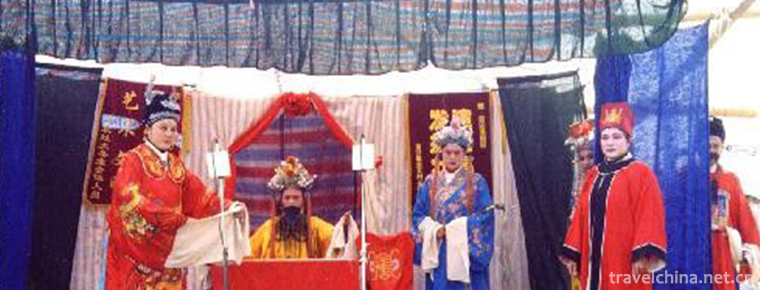
-
Huanglong Scenic Area
Huanglong Scenic Spot, World Natural Heritage, World Human and Biosphere Reserve, Green Globe 21 Certificate, National AAAAA Tourist Spot, National Key Scenic Spot..
Views: 162 Time 2018-12-12 -
Yanoda Tropical Rainforest Scenic Area
Yanuoda Tropical Rainforest Scenic Area is the only tropical rainforest located at 18 degrees north latitude in China. It is the concentration of five tropical rainforests in Hainan Island.
Views: 122 Time 2018-12-12 -
Helan Mountain Rock Painting
Helan Mountain Rock Painting is a national key cultural relics protection unit, the national AAAA level tourist attractions, the national research tourism demonstration base (2016 one of the first 20).
Views: 97 Time 2019-01-13 -
Lion Mountain Scenic Area
Lion Mountain Scenic Area is located in the east of Shaoshan Scenic Area, which is divided into Lion Mountain Scenic Area and Benbenling Scenic Area..
Views: 373 Time 2019-02-08 -
Stories of Marine Animals
Marine animal stories are mainly handed down orally. The traditional folklore stories circulated in the islands for a long time have been formed and disseminated in Dongtou.
Views: 274 Time 2019-05-02 -
Mongolian Chur
"Chuoer" is an ancient vertical wind instrument of Tuva people of Mongolian nationality in Xinjiang, which mainly distributes in Mongolian inhabited areas of Altay region. The Tuva people of.
Views: 86 Time 2019-06-03 -
Shaoyuan mythological group
Shaoyuan myth group is one of the ancient Chinese myths and legends. Refers to the general name of the creation myths and mythological prototypes circulated in Shaoyuan Town, Jiyuan City, Henan Provin.
Views: 152 Time 2019-06-14 -
Legend of bald tailed Lao Li
Folk legends of bald-tailed Lao Li are widely circulated in Shandong Province, and similar written records are found in Yuan Mei's Zi Yu of the Qing Dynasty: "Bi Shifu, Wendeng County, Shandong P.
Views: 128 Time 2019-06-23 -
Wudu Alpine Opera
Wudu Alpine Opera, also known as Alpine Opera, is one of the two unique local operas in Gansu Province. In 2008, Wudu Alpine Opera was selected as the second batch of national intangible cultural heri.
Views: 168 Time 2019-06-30 -
Xiaolan Chrysanthemum Club
Xiaolan Town, located in the middle of the Pearl River Delta, is an important town in Zhongshan City, Guangdong Province. Xiaolan has the reputation of "Chrysanthemum City". Chrysanthemum cu.
Views: 271 Time 2019-07-06 -
Cai Jing
Cai Jing (February 14, 1047 - August 11, 1126), character length, Northern Song Dynasty Prime Minister , calligrapher, Xinghua Army Xianyou County cixiao Li Chi Ling (Xianyou County, Putian City, Fuji.
Views: 181 Time 2019-09-14 -
Dazhou climate
Dazhou city belongs to subtropical humid monsoon climate type. Due to the complex topography, regional climate differences are large. The low mountains, hills and river valleys with an altitude of 800 meters have mild climate, warm winter, early sprin.
Views: 385 Time 2020-12-20

